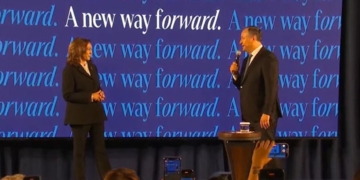The one and (probably only) presidential debate between Vice President Kamala Harris and former President Donald Trump has come and gone, and precious little time was spent on the topic that polls show voters care about the most: cost of living.
Even as inflation recedes from painful highs, the economy remains far and away the number one concern for voters, more than double the next nearest issue, according to a recent Fox News survey.
For nearly four years, the Biden-Harris administration has pushed an antitrust agenda that has pushed prices higher across the board. Here are three examples worthy of more scrutiny.
First, the Federal Trade Commission (FTC) and FTC Chair Lina Khan continue unabated in their mission to break up Amazon. Like Captain Ahab in Moby Dick, the FTC’s vendetta against the online retailer knows no limits. In 2017, Khan became a progressive star with her Yale Law Journal dissertation titled “Amazon’s Antitrust Paradox.” In the piece, Khan takes aim at the company for keeping prices too low, a principle she has at times disavowed in pursuit of her political agenda.
Last year, the FTC launched a lawsuit against Amazon, which faces fierce competition from a growing number of both newer online entrants and existing brick and mortar retailers.
Amazon has also been a lifeline for consumers. Nearly nine-in-ten planned to take advantage of the deep discounts of Amazon Prime Day for their back-to-school needs, according to a poll from JLL. Two-thirds (66%) believe that breaking up large technology companies will result in higher prices for consumers.
Second, with overall food prices elevated — 26% higher in July 2024 than the end of 2019 — the Biden-Harris administration is not only blaming grocery stores, but impeding their efforts to streamline their operations. One of the only substantive policy proposals from the early days of the Harris campaign was a vague outline about curbing “price gouging.” The scheme was widely panned by even typically friendly voices, including the Washington Post editorial board, which dubbed the idea full of “gimmicks.”
Meanwhile, Khan’s FTC launched a high-profile lawsuit to stop a proposed merger between Kroger and Albertsons, which was a free-market attempt to increase competition and better position the stores for success against the big companies like Walmart, the nation’s largest grocery with more than a fifth of the market.
Grocery prices are up about 20% from four years ago, and the Biden-Harris administration is blocking efforts to shake up the status quo.
Finally, there is the never-ending focus on electric vehicles that consumers are rejecting. During her tenure as vice president, Harris has even wanted to make school buses electric. “Can you raise your hand if you love a yellow school bus?,” she gushed in 2022. Her focus on this topic has been — to borrow a term favored by the Harris-Walz campaign — “weird.”
But it goes even further. Under the Clean School Bus Program (CSBP), nearly $1 billion was shelled out for 389 school districts purportedly for 2,463 electric school buses. Two years later, according to reporting from the Washington Free Beacon, the program has produced just 60 buses. Vice President Harris has been the voice of this project for the Administration.
Meanwhile, consumer demand for electric vehicle mandates continues to wane. A Pew Research Center survey from June showed that only about 3 in 10 Americans would consider purchasing an electric vehicle, down 9 percentage points in the past year. Ford made waves recently for dialing back their EV production. Yet, if the current administration has their way, the school buses we all know and love will be replaced by electric versions that we don’t want — as soon as 2030, according to Harris’ 2019 campaign climate plan.
This year’s presidential election takes place in a challenging economic environment. Most Americans believe the American Dream is not achievable. Misguided antitrust policies from the Biden-Harris administration are only making matters worse.
Let’s hope that conservatives can force a conversation about these topics between now and November.
A former U.S. senator and ambassador, Scott Brown is chair of the Competitiveness Coalition.
The views and opinions expressed in this commentary are those of the author and do not reflect the official position of the Daily Caller News Foundation.
(Featured Image Media Credit: Screen Capture/CSPAN)
All content created by the Daily Caller News Foundation, an independent and nonpartisan newswire service, is available without charge to any legitimate news publisher that can provide a large audience. All republished articles must include our logo, our reporter’s byline and their DCNF affiliation. For any questions about our guidelines or partnering with us, please contact [email protected].



























 Continue with Google
Continue with Google